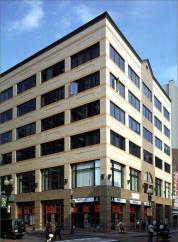April 23, 2009
The Real Reporter – By Joe Clements
BOSTON – With a mission to rebuild challenged communities, they are used to sticking things out for the long haul, and the Metropolitan Area Planning Council is doing exactly that here in the Hub’s beleaguered Downtown Crossing.  MAPC has renewed its lease and expanded to 12,000 sf at 60 Temple St., a six-story office/retail building owned by BPG Properties Ltd. that has been the agency’s home dating back to the 1990s.
MAPC has renewed its lease and expanded to 12,000 sf at 60 Temple St., a six-story office/retail building owned by BPG Properties Ltd. that has been the agency’s home dating back to the 1990s.
“We’re very happy to be here in Downtown Crossing and look forward to staying here for another 10 years,” MAPC official Stephen Daly says of the extension, negotiated by broker Debra Stevens for the tenant and Karyn McFarland representing the landlord. During its decades at the building, MAPC has watched Downtown Crossing undergo various changes, many on the plus side such as the Lafayette Mall renovation; construction of the 36-story One Lincoln St. office tower; and a new Ritz Carlton Hotel and condominiums.
Despite such upgrades, record retail vacancies exacerbated by the recession and the shuttered Filene’s mixed use project, have cast a pall over the district. Daly says the 60 Temple St. deal reflects optimism that the difficulties will soon be in Downtown Crossing’s multi-layered past. MAPC is confident the $700 million Filene’s venture by Gale International and Vornado Realty Trust will get the needed financing to re-launch and invigorate Downtown Crossing as promised long before MAPC’s 10-year lease extension expires. “It is going to come around,” Daly insists, predicting the existing high-end residences will soon elevate retail options and fill empty storefronts.
As it is, BPG Ltd. regional manager Michael Rota says an empty 4,500-sf retail unit at 60 Temple St. is close to landing a tenant. Rota is equally ebullient about retaining MAPC, especially since the group is backfilling space surrendered by a downsizing tenant. That keeps the office portion of 60 Temple St. full. “It worked out great for us and for them,” Rota says, concluding that BPG’s offer ultimately made the most sense for MAPC. “Everybody was pleased,” he says.
Intent on striking a fiscally astute deal, Daly says MAPC did consider a range of options introduced by Stevens, a tenant representation specialist and principal at The Stevens Group of Boston. The search was limited to within a 10-minute walk to city, state and federal offices such as the Massachusetts State House, and Daly says the year-long review included properties as far afield as the Seaport District. “We were serious,” he says of moving if the right opportunity appeared.
In the end, Daly explains, BPG was willing to recognize the market shift in rents and adjusted accordingly while also providing upgrades. “The quality of our space is going to be substantially better,” Daly reports. Yet even with generous fit-out allowances and the expansion, MAPC will save close to $500,000 over the lease term, estimates Daly, MAPC’s director of municipal governance who termed Stevens “fantastic” in her market perception. “She has been a tremendous help all the way,” says Daly. An SVP at Grubb & Ellis, McFarland also deserves praise, says Daly, as do Rota and the BPG team overall. “They were outstanding with the patience they showed and in recognizing what we needed to be able to stay here,” says Daly, further citing BPG’s interiors fit-out specialist, John Kelly of Fusion Design Consultants, for providing an efficient layout that will enable MAPC to accommodate more people.
While specifics of the rent were not provided, Daly says MAPC felt it could go no higher than the “low $30’s,” and says the deteriorating office market did play in the group’s favor to achieve those aims. Internally, MAPC Executive Director Marc Draisen oversaw the leasing process, according to Daly, seeking “a contemporary and professional space” to invigorate both staff and MAPC’s hundreds of constituents who visit the headquarters for meetings and other purposes. “The Space we will have is going to be indicative his vision for MAPC’s future,” says Daly. Not only will the interior be modernized. BPG is incorporating sustainability elements that aim to decrease energy costs and reflect MAPC’s commitment to new millennium thinking in the planning universe.